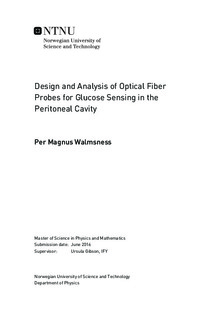Design and Analysis of Optical Fiber Probes for Glucose Sensing in the Peritoneal Cavity
Master thesis
Permanent lenke
http://hdl.handle.net/11250/2405158Utgivelsesdato
2016Metadata
Vis full innførselSamlinger
- Institutt for fysikk [2713]
Sammendrag
This thesis is focused on the design and analysis of optical fiber probes for glucose sensing in the peritoneal cavity. The probes are to be used as absorption cells for near-infrared absorption spectroscopy of peritoneal fluid. A design based on miniature spherical cavities with highly reflective walls is proposed for investigation. The design is based on optical fibers entering a spherical cavity through a microfluidic channel. Active pumping of peritoneal fluid is envisioned, along with possibilities of achieving in-vivo rinsing of the probe. A Monte Carlo model is implemented to study the behaviour of the spherical cavity probe in turbid media. Results from the model suggest that the probe is resistant to losses due to light scattering, and that optical path lengths much longer than the physical size of the probe are obtainable. Early prototypes of spherical cavities are designed and fabricated in aluminium and PTFE. Investigation of the performance of the fabricated cavities, using several fiber configurations, is done experimentally. The cavities behave as expected, and the results suggest possibilities of significant performance increases when moving to a more sophisticated fabrication process. Experimental work with spherical cavities filled with fluids of various optical properties is needed to better understand the proposed design and to verify parts of the results from the model.
